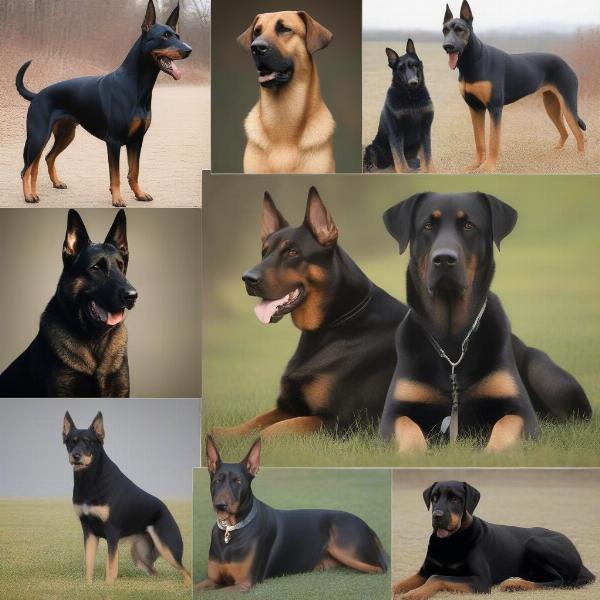Protective family dogs are a popular choice for many households looking for both a loving companion and an added sense of security. But choosing the right breed requires careful consideration of temperament, trainability, and compatibility with your family’s lifestyle. This guide will delve into the key factors to consider when selecting a protective family dog, highlighting breeds known for their guardian instincts, and providing essential tips for training and responsible ownership.
What Makes a Good Protective Family Dog?
While many breeds exhibit protective tendencies, a truly good protective family dog possesses a combination of loyalty, intelligence, and a balanced temperament. They should be naturally wary of strangers but not overly aggressive, and readily responsive to training. A well-trained protective dog will deter potential threats through barking and assertive posturing, rather than resorting to biting. This balance is crucial for ensuring the safety of both your family and the people you encounter.
Top Protective Dog Breeds for Families
Several breeds are renowned for their protective instincts and suitability for family life. Here are some popular choices:
German Shepherd
Known for their intelligence and loyalty, German Shepherds are highly trainable and excel in various roles, including protection. They are naturally watchful and protective of their family.
Rottweiler
Rottweilers are powerful and imposing dogs with a strong protective instinct. With proper socialization and training, they can be loving and devoted family companions.
Doberman Pinscher
Elegant and athletic, Doberman Pinschers are intelligent and vigilant. They are naturally suspicious of strangers, making them excellent guard dogs.
Giant Schnauzer
Giant Schnauzers are large, powerful dogs with a commanding presence. They are known for their intelligence, loyalty, and protective nature.
 Different Protective Dog Breeds
Different Protective Dog Breeds
Factors to Consider When Choosing a Protective Breed
Choosing a protective breed requires careful consideration beyond just reputation. Here are key factors to consider:
Temperament and Trainability
A dog’s temperament plays a crucial role in its suitability as a protective family dog. Look for breeds that are known for being loyal, even-tempered, and responsive to training.
Size and Energy Level
Consider your living space and lifestyle when choosing a breed. Larger breeds require more space and exercise, while smaller protective breeds might be better suited for apartment living.
Socialization and Training Needs
Early socialization is critical for any dog, especially protective breeds. Proper training ensures they can distinguish between real threats and harmless situations, preventing unnecessary aggression.
Training Your Protective Family Dog
Effective training is essential for shaping a protective dog’s behavior and ensuring they understand their role. Focus on obedience training, socialization, and clear communication.
Obedience Training
A well-trained dog is a safe dog. Basic obedience commands like “sit,” “stay,” “come,” and “down” are crucial for controlling your dog’s behavior and preventing unwanted aggression.
Socialization
Expose your dog to various people, places, and situations from a young age. This helps them develop appropriate social skills and reduces the likelihood of fear-based aggression.
Professional Guidance
Consider seeking professional guidance from a certified dog trainer or behaviorist. They can provide tailored training strategies based on your dog’s breed and temperament.
Conclusion
Choosing a protective family dog is a significant decision. By carefully considering factors like breed characteristics, temperament, training needs, and your family’s lifestyle, you can find the perfect canine companion to provide both love and security. Remember that responsible ownership, including proper training and socialization, is crucial for ensuring a happy and harmonious relationship with your protective family dog.
FAQs
- What is the best protective dog breed for families with small children? While several breeds can be great with children, breeds like Golden Retrievers and Labrador Retrievers are known for their gentle nature and patience, while still offering a degree of protectiveness.
- How much exercise does a protective dog need? Exercise needs vary by breed, but most protective breeds benefit from regular physical and mental stimulation, such as daily walks, playtime, and interactive games.
- Is it necessary to hire a professional trainer for a protective dog? While not always mandatory, professional training can be invaluable, especially for first-time owners of protective breeds. It helps establish clear communication and ensures the dog understands its boundaries.
- How do I socialize a protective dog breed? Start socialization early, gradually exposing your puppy to different people, places, sounds, and experiences. Supervised playdates with other well-socialized dogs can also be beneficial.
- What are the signs of aggression in a protective dog? Signs of aggression can include growling, snarling, lunging, biting, or excessive barking. If you notice any of these behaviors, consult with a professional trainer or behaviorist.
- Are protective dogs good with other pets? With proper socialization and introduction, many protective breeds can coexist peacefully with other pets in the household.
- How can I ensure my protective dog doesn’t become overly territorial? Consistent training, socialization, and setting clear boundaries are essential for preventing excessive territorial behavior.
Related Articles
ILM Dog is a leading international online resource dedicated to providing expert advice on dog care and breeding. We offer a wide range of resources covering breed selection, health, training, nutrition, grooming, and more. Whether you’re a new dog owner or a seasoned enthusiast, ILM Dog is here to support you every step of the way. Contact us today for personalized guidance and support: Email: [email protected], Phone: +44 20-3965-8624. Learn more about us at ILM Dog.